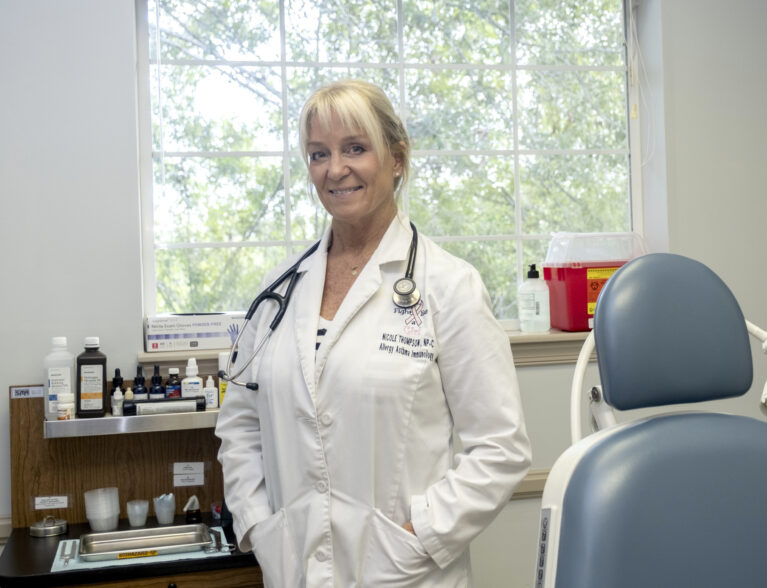
For people with a peanut allergy, avoiding an attack involves much more than skipping a PB&J sandwich in school.
According to the American Chemical Society, about 3 million Americans, both children and adults, suffer from peanut allergies. Of the approximately 150 children who die every year from food allergy reactions, 100 of those are attributed to peanuts. And the number of affected people increases annually.
Medical professionals believe a dramatic increase in cases among children began in 2008 when pediatricians began advising parents not to include peanuts in their children’s diets until they were at least three years old.
Nicole Thompson, APRN-C, says the harm done by that action is measurable. “There was an 18 percent increase in cases following the initial suggestion,” she says. “But, in 2017 when the CDC changed the conversation and encouraged early, gradual introduction into the child’s diet – by 12 months of age at the latest – there was a 16 percent reduction.”
Despite that, she adds that cases have tripled over the last 15 years and approximately 1 in every 50 children has developed the allergy.
Given these statistics, clinical trials are underway with one generating a lot of positive response: SLIT – sublingual immunotherapy using a food allergen extract.
Thompson says it is the first treatment of its kind specifically for peanut allergy and it’s exciting for several reasons. “Since it’s sublingual, it dissolves under the tongue, meaning it bypasses your gut and esophagus, avoiding potential problems in those areas.
“It’s safe and simple, and initial tests produced the efficacy they were looking for.”
Dr. Edwin Kim, associate professor of pediatrics at the University of North Carolina School of Medicine and the father of two children with the allergy, led the research in which peanut SLIT was provided to patients as a liquid extract in a small plastic bottle with a pump. The designated number of pumps of the SLIT liquid is pumped under the tongue of the patient, who holds the liquid there for 2 minutes and then swallows it.
The dosage of SLIT is gradually increased from 2mg to 4mg. After the patient finishes each treatment, he or she is typically watched for 30 minutes to make sure there are no side effects.
Of the 54 peanut-allergic children participating in the study, 47 completed the treatment with 70 percent showing protection against accidental exposures to peanut and 36 percent showing full desensitization.
Indications are that it takes 22 weeks before the SLIT desensitization wears off and the patient would become reactive to small amounts again.
Thompson says the treatment looks very good so far. “But it’s still imperative to carry an EpiPen at all times and avoid exposure to peanuts if allergic. Plus, there are unanswered questions, like whether to give SLIT treatment if you’re sick with something else.”
We also need to tackle why there are so many allergies – not just to peanuts. “I’m passionate about allergies,” Thompson says.
A leading theory behind the rising numbers is the ‘hygiene hypothesis,’ which suggests that living conditions in much of the world are too clean and that kids aren’t being exposed to germs that train their immune system to tell the difference between harmless and harmful irritants.
“Everything is anti-bacterial,” says Thompson, “we’re over-cleaning with products that keep the body from developing an efficient immune system.”
She also stresses the connection between eczema and peanut allergy in children. “The most common way for kids to be first exposed to peanuts is through the skin, and if theirs is broken or cracked because of eczema, it’s easier for allergens to get in.”
“Immunobiology is the future of everything allergen-specific,” says Thompson. “With all these promising options, sublingual is what I’m hoping for.”
Nicole M. Thompson, APRN-C, is a Family Advanced Registered Nurse Practitioner with a master’s degree from Florida Atlantic University. She received her RN in 1994 and has practiced in a variety of clinical settings, including hospital, private practice and research facilities. She is nationally board-certified by the American Academy of Nurse Practitioners. She specializes in allergy, asthma and immunology with over 30 years of experience. In addition, she received the ACRP Certification from the Association of Clinical Research Professionals. She is affiliated with the American College of Allergy, Asthma and Immunology where she continues Clinical Medical hours to advance her scope of practice. She currently runs the Allergy, Asthma and Immunology department with Associated Coastal ENT, with offices in Fort Pierce and Port St. Lucie. She is accepting new patients: Fort Pierce, 772-464-9595; Port St. Lucie, 772-335-1351.



